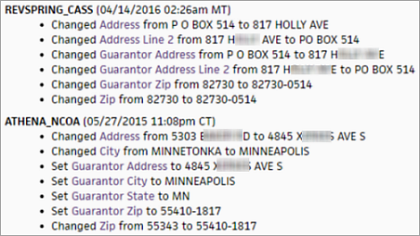 User Guide — Address Management: NCOA and CASS
User Guide — Address Management: NCOA and CASS
athenahealth uses the National Change of Address® (NCOA) management service and the Coding Accuracy Support System (CASS™) to ensure that your patients and guarantors who have moved will receive their statements faster, reducing delays in payment to your practice. This service provides a link between athenaOne and the United States Postal Service® (USPS) change-of-address information. athenaOne updates patient and guarantor addresses to match the current USPS data automatically.
Using the USPS National Change of Address (NCOA) management service and the Coding Accuracy Support System (CASS), athenaOne retrieves and incorporates change-of-address information, ensuring that:
- Patients and guarantors receive statements in a timely manner.
- Your practice is notified when the USPS cannot deliver mail to a patient or guarantor address.
After athenahealth sends statements to our vendor for processing, we receive three files containing patient guarantor names and addresses.
- File 1 lists invalid addresses. These include improperly formatted addresses (such as no street number or invalid ZIP code), as well as old addresses with no forwarding address on file. The USPS cannot deliver mail to these invalid addresses.
- File 2 lists patient guarantors with a change-of-address on file with the USPS.
- File 3 lists formatting changes for valid addresses. For example, this file would suggest that "123 Main Street" be reformatted to "123 Main St." so that USPS can process the mail as efficiently as possible.
If a patient's guarantor appears in File 1 (the invalid address file), athenaOne compares the guarantor name and address in the file to the guarantor name and address in athenaOne. Based on this comparison, athenaOne either moves the patient account to HOLD with a specific Hold Statement Reason, or does nothing.
If a patient's guarantor appears in File 2 or File 3, athenaOne updates the address in the patient's account and mails the statement to the corrected address.
If you do not want athenaOne to update patient and guarantor address information automatically, please contact the CSC from athenaOne > Support > Success Community > Contact Client Support Center to disable this feature.
Note: We recommend that you not disable this feature. If you do, the number of statements sent to incorrect or outdated addresses will increase.
Here are some common address scenarios and how athenaOne manages each one.
Scenario 1: The patient guarantor's name and address in File 1 (the invalid address file) match the patient guarantor's name and address in athenaOne. The patient guarantor address is improperly formatted.
Action: athenaOne moves the patient account to HOLD using the "Bad Address — Invalid Address" Hold Statement Reason. If you click the show history link at the bottom of the Patient Registration page, you see information like this:

Scenario 2: The patient guarantor's name and address in File 1 (the invalid address file) match the patient guarantor's name and address in athenaOne. The patient guarantor address has no forwarding address.
Action: athenaOne moves the patient account to HOLD using the "Bad Address — No Forwarding Address" Hold Statement Reason. If you click the show history link at the bottom of the Patient Registration page, you see information like this:

Scenario 3: The patient guarantor's name and address in File 1 (the invalid address file) do not match the patient guarantor's name and address in athenaOne.
Action: athenaOne does nothing. If there is no match, athenaOne assumes that practice staff entered the correct address after the statement was generated.
Scenario 4: The patient guarantor's name and address in File 2 (the change-of-address file) or File 3 (the address formatting file) match the patient guarantor's name and address in athenaOne.
Action: If the patient is the guarantor, athenaOne updates both the patient and guarantor addresses to match the change-of-address on file with the USPS. If the patient is not the guarantor, athenaOne updates only the guarantor address. The statement is then sent to the updated address. If you click the show history link at the bottom of the Patient Registration page, you see information like this:

Scenario 5: The patient guarantor's name and address in File 2 (the change-of-address file) or File 3 (the address formatting file) do not match the patient guarantor's name and address in athenaOne.
Action: athenaOne does nothing. If there is no match, athenaOne assumes that practice staff entered the correct address after the statement was generated. The statement is then sent to the original address.
To report on patient records that have been updated based on NCOA and CASS information, you can run the USPS Automated Address Update Report. This report is on the Patients tab of the Report Library.
Note: To use this report, you must have access to the Report Library.